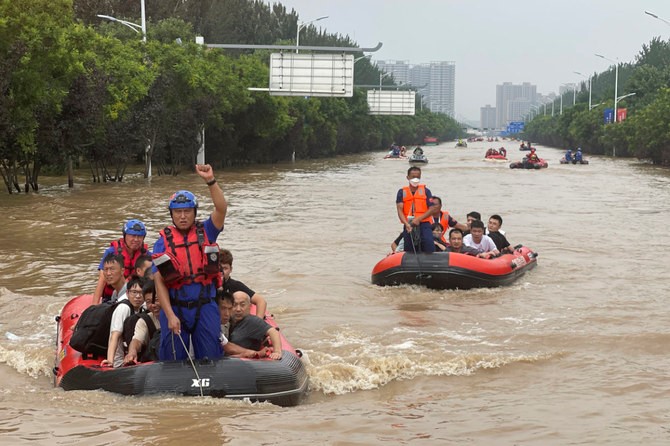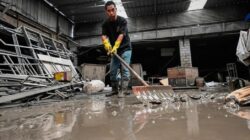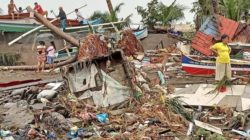ZHUOZHOU, China – Over the past three days, China’s capital has experienced the highest rainfall in at least 140 years as remnants of Typhoon Doksuri deluged the region, converting streets into canals where emergency crews utilised rubber boats to rescue stranded citizens.
The city received 744.8 millimetres (29.3 inches) of rain between Saturday and Wednesday morning, according to the Beijing Meteorological Bureau.
Because of the record rainfall, Beijing and the neighbouring province of Hebei saw significant flooding, with waters reaching to dangerous levels. The rain washed out roads, electrical lines, and even drinking water pipes. It inundated the waterways surrounding the capital, submerging cars and forcing others onto pedestrian bridges.
The death toll from the severe rains in and around Beijing increased to 21 on Wednesday after the body of a rescuer was discovered. Wang Hong-chun, 41, was on a rubber boat with other rescuers when it capsized in a swiftly running river. Four of her teammates were rescued.
At least 26 persons have gone missing as a result of the rains.
Zhuozhou, a small city in Hebei province that borders Beijing’s southwest, is one of the hardest damaged locations. On Tuesday night, authorities in the area posted a social media call for lights to aid in rescue efforts.
Rescue personnel used rubber boats to navigate the flooded city, evacuating families who had been trapped in their houses without running water, gas or electricity since Tuesday afternoon.
“I didn’t think it would be that severe; I thought it was just a little bit of water that would recede,” Wang Huiying, 54, said. As the water seeped into the first floor, which houses her steamed bread shop, she ended up spending the night on the third floor of her building. All of the machinery is now submerged.
It’s unclear how many people are stranded in flood-ravaged regions of the city and adjacent communities. Other provinces’ rescue teams arrived in Zhuozhou to assist with evacuations.
“We have to grasp every second, every minute to save people,” said Zhong Hongjun, leader of a rescue squad from Jiangsu province’s shore. Zhong stated that he had been working since 2 a.m. Wednesday, when they came, and that he plans to continue all night. So far, they have saved approximately 200 people. “A lot of the people we saved are elderly and children,” he explained.
Waters in Gu’an county, Hebei, which borders Zhuozhou, reached halfway up a pole where a surveillance camera was put on Wednesday.
Liu Jiwen, 58, of Gu’an county, was evacuated from his village on Tuesday night. “There isn’t anything we can do.” “It’s a natural disaster,” he explained.
Two more persons were attempting to cross the flooded areas in order to reach a relative who was trapped in a neighbouring community.
Local authorities in Hebei province reported that about 850,000 individuals had been moved.
The previous rainfall record was set in 1891, according to the Beijing Meteorological Bureau, when the city got 609 millimetres (24 inches) of rain. Machines made the first precise measurements in 1883.
The recent downpour, according to Ma Jun, director of the Institute of Public and Environmental Affairs, was “extreme.” The total rainfall in Beijing last year did not even reach 500 millimetres (19.6 inches).
Because certain areas face frequent flooding, Ma believes that city planning should be reviewed. “We need to avoid building large-scale construction… in low-lying areas,” Ma remarked.
Doksuri’s record rainfall, now weakened to a tropical storm, may not be the last. Typhoon Khanun, which made landfall in Japan on Wednesday, is predicted to make landfall in China later this week. The severe storm, which has surface speeds of up to 180 kph (111 mph), is also expected to lash Taiwan before reaching China.
Thousands of people were evacuated to shelters in schools and other public facilities in Beijing’s suburbs and neighbouring cities. The central government has allocated 44 million yuan ($6.1 million) to disaster relief in the affected provinces.
The ferocity of the flooding surprised the Chinese capital. Summers in Beijing are typically dry, but this year saw a period of record-breaking heat.
Source: AP










